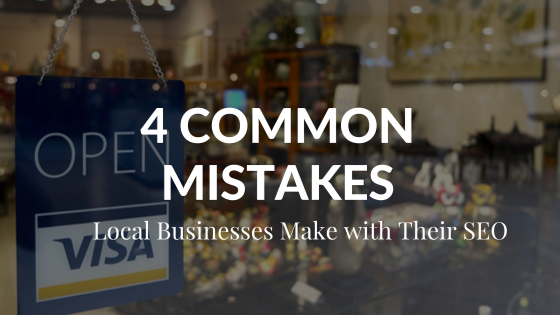
4 Most Common Mistakes Local Businesses Make with their SEO

These days, optimizing your site for search engines is a must for every company, big of small. Whether your customers shop online or in-store, chances are their buying process will begin with a quick search online.
Many local brick-and-mortar shops don’t see a direct benefit to be gained from SEO, so they largely neglect it. Here are a few of the most common mistakes local businesses make and what you can do to avoid them.
1. Not having enough local citations
A local citation is any mention of a business name and address on other websites. One example would be a page for your business on a local directory or chamber of commerce page. Often these mentions include a link back to the business’s site, but this isn’t always the case.
Citations are a key factor in ranking algorithms for Google and Bing as they help search engines confirm and validate information about a company. It may seem like your number one priority to rank well is making sure your site is optimized, but you should not neglect to get local citations from others.
2. Inconsistent citations
As stated, search engines like to see businesses with lots of local citations because it helps confirm information about that business. However, to gain the greatest benefits from citations, you must make sure they all have consistent info.
Many local businesses will make sure the information on their site is up to date, but neglect to go back and try to update offsite info.
Google wants to make sure its results are as accurate as possible. If you say your store’s address is 123 Main Street on your site, but it’s listed as something else on ten other sites, that’s a red flag for the search engine and could jeopardize your ranking.
3. Unverified business page on Google
This seems like a no-brainer, but you’d be surprised at how many companies neglect to verify their Google My Business listing.
One reason for this is the fact that the process itself feels a little outdated. To verify your address, you have to request a postcard from Google that includes a unique code for you to enter online.
The delay between the request and the receipt of the postcard can cause many business owners to mistake the card for junk mail, but the process must be completed if you want to verify your business.
4. No interaction with customer feedback
Once you have your Google My Business listing up and running, customers will be able to leave you reviews which are displayed alongside other information like your address and business hours.
No matter how good your product or service is, you are likely to receive bad reviews from time to time.
Many business owners try to ignore these reviews, but that’s a mistake. While it’s true that Google (and potential customers) like to see lots of good reviews, Google also likes it when businesses interact with customers.
Take the time to respond to negative criticism and show that you are listening to feedback from customers. Not only can it improve your rank on Google, but it can also improve your reputation with customers.
Is your local SEO lacking? Find out by getting a free audit from Clicks and Clients. We’ll help you pinpoint areas that can use improvement to help increase your rank in search results.
Tags In
Paul Rakovich
Browse All PostsTell Us Your Goals
Recent Posts
- Google PMax: Get the Most Out of Your Ad Campaigns While Combating Fraud
- Lead Ads Don’t Have to Suck: How to Leverage Them Correctly
- Why More Expensive PPC Ads are Almost Always Worth It
- Unlock the Secrets of Organic CPA: The Ultimate Guide to Cost Per Acquisition
- Secrets We’ve Learned from Years Working with Paid Account Reps at Meta, TikTok, LinkedIn and Google


